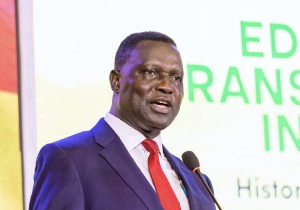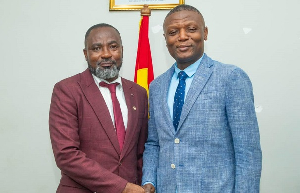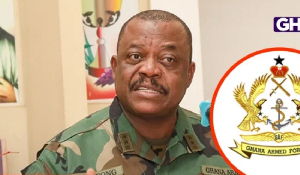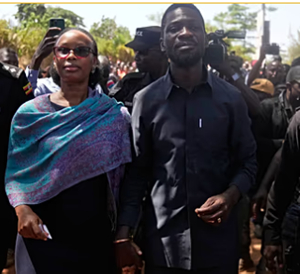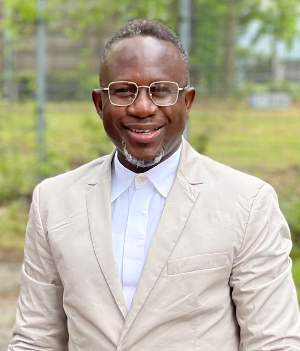My initial training was to be an economist so I start my piece with the orientation of Adam Smith.
"It is not from the benevolence of the butcher, the brewer or the baker that we expect our dinner, but from their regard to their own interest. We address ourselves, not to their humanity but to their self-love, and never talk to them of our own necessities but of their advantages. Nobody but a beggar chooses to depend chiefly upon the benevolence of his fellow- citizens." (Adams smith: The wealth of Nations)
"A time comes when silence is betrayal. That time has come for us in relation to (political decisions and negotiations of our political representatives in Ghana) Vietnam. The truth of these words is beyond doubt but the mission to which they call us is a most difficult one. Even when pressed by the demands of inner truth, men do not easily assume the task of opposing (speaking against) their government’s policy, especially in time of war (eve of elections). Nor does the human spirit move without great difficulty against all the apathy of conformist thought within one’s own bosom and in the surrounding world. Moreover when the issues at hand seem as perplexed as they often do in the case of this dreadful conflict (injustice to history and cannons of equity) we are always on the verge of being mesmerized by uncertainty (doubt of the real intentions of our leadership); but we must move on” (and represent our position nonetheless, regardless of the repercussions). (Martin Luther King Jnr, 1967 (Emphasis are mine))
I wish to dedicate the above words of Martin Luther to the courageous youth (particularly the NDC guys) in Northern Region and Upper East Region who spoke on the occasion of technical university conversion in Ghana (http://news.myjoyonline.com/news/2016/March-7th/convert-northern-polytechnics-into-technical-universities-too-group.php).
Like the concerns that motivated Martin Luther to deliver the ever powerful “Silence is a betrayal” speech in I967, so has many confronted me with such confusion galvanized in clouds of uncertainty and fear about the future of my dear country. I must admit that the civil being in me has been unforgiving for keeping quiet over issues of development in the Northern regions of Ghana. It has come to a time where my conscience has condemned me to the prison cells of self-betrayal and that I must speak. And to disregard such a noble reawakening is to deny myself the golden opportunity to rediscover my confidence and break the shackles of oppression that has held me into assuming an identity meant for feeble minds and timid hearts. Our type were not to be quiet, we were meant to hear first and then represent our position and throughout childhood, my refusal to be stamped on, justifies that I have given up enough and now is not the time to forget values and ideals I painfully paid and continue to pay for choosing to internalize. And so, I elect to speak up. To speak on matters of politics in Ghana and leadership in my dear country, tertiary education (UDS-autonomy and technical university in the three regions of the north) and developments of microfinance institutions notably the one reportedly owned by my good personal friend and former classmate in Nandom Secondary school, DKM.
And to this reawakening, I am required to speak and call on voices of conscience to heed the advice of Martin Luther and speak even more. Every discerning voice of the three regions of the north must speak up to issues of national policy and development of our communities. We must reengage our Parliamentarians and President-Brother. It will not be anything new. It was done before and the outcome is the better sides that we are now. During the earlier liberation attempts and renaissance struggles of our patriots for the liberation of Northern Ghana, history has decorated the personalities of those that represented us on the fronts of Northern Tribunal Council and Northern People’s Party to stand to negotiations between Kwame Nkrumah’s CPP, Busia’s UP. Through their unflinching love for their children and grandchildren they knew will need to remember them, they fought and fighting they bequeath a Ghana of few opportunities and new possibilities for the Northern Ghanaian for which today we have a brother as the most powerful figure in Ghana. The history of Ghana is replete with such confrontations but that is not my interest for now. My interest is on the politics of tertiary education in Ghana and education in Northern Ghana.
I do not seek, in this first of a three part series to be-labour the fact that current crop of leaders from Northern Ghana has left us down. But even if I did, I believe strongly that I would be justified. Yet, I choose to do something else, to reflect on that critical history of access to education in my bid to add my voice to the fact that all the three regions in the North deserve even more than a technical university in the spirit of fairness and equity in development. I wish to stress that even in those repressive times, first from colonial government through slavery to Nkrumah’s and later Busia’s desire to maintain the statusquo as in allocation of development and educational resources, leadership at that time, represented by Northern Peoples party, did not throw its hands up in utter desperation. Northern emancipation and genius survived and we got Tamasco first, Lawra secondary and the rest that follows. Need I remind us of the independent struggles of Northern chiefs, Alhaji Mumuni Bawumia, Jatoe Kaleo, Naa Karbo, Dombo to name just a few? The northern resilience has lived on throughout history and in most difficult oppressive times to expand educational access. And we must remind ourselves of the responsibility to revive this history of denial and marginalization unrelentingly with the seriousness that it deserves.
It is important for me to add that even when slavery was abolished and the “Occupationist” agenda was in full force, the colonial government licensed itself to give the northern regions double agony of colonialism by drawing out human resources to work on cocoa plantations and support developments of the southern regions of the country. That is why today, no region can boast of any old educational institution that can measure up to the others established earlier in the country and therefore to set general requirements or standards for anything Northern Ghana to meet before promotion or upgrading, is to deliberately play to our faculties and unjustifiably deny us. And it is unfortunate this is happening at the climax of the realization of our forebears’ struggles for their children. Today we are ruled by a Northern Son who is also a student of this history I am interpreting.
I may be taken on for sounding tribalistic yet to take me on is to seek a futile reconstruction of the facts as in Dr. Kwame Nkrumah’s conception of a “Nationalist” when he was confronted with accusations of being Tribalistic by his opposition. “One must be a Tribalist to be a Nationalist”. In Nkrumah’s view, the idea of nationalism can be seen as a microcosm of the love one has first for his family, then to his community, to his region and then to his country. Viewing nationalism with the nationalist lens of Nkrumah, its clear that nationalism can only be conceived when explained in the light of ripple and spiral effects when a piece of stone is thrown into a pool of calm water. And true to his understanding of a true nationalist which I find myself admiring so much, Nkrumah justified his position and subsequently assumed his “true” nationalist conscience which saw him declaring independence not only for Ghana but the entire Africa through his famous “….our independence is meaningless...” speech. It was not only Nkrumah whose conception of nationalism as tribalist consciousness that brought freedom and development to his people, the China that we have all unanimously referred as the next big thing to happen to the world also had its development history properly explained and documented by Henry Kissinger in this regard.
In the unlikely event that any modern day nationalist advocate still wants to take me on, he/she should first question and seek understanding for the conception of representation in this modern democracy and local governance that we have. The idea is that, every representative engage and negotiate (including lobbying in all its forms) with others’ representatives so that in the “normal-likely” event that national resources are limited, the strong “representative-negotiator” takes a share for his/her constituents. In the spirit of the above, a true nationalist (one that merits the letters) with tribalist consciousness, never returns to his/her constituents with empty hands and explanation. I will demonstrate in the remaining part of this write up that in the politics and the democracy that we have, no region ever gets what it deserves, rather it gets want its political representatives negotiate for. And I call on the Northern Ghana and Upper West Regional parliamentary caucus to organize and give this a reflection.
In the final analysis of black liberation, the independence of Ghana, the development of Northern Ghana and the allocation of educational resources to my dear Upper West Region, only one valid conclusion can be drawn. That it is as all about political decisions and stronger negotiations than right or deserving. That we never deserved anything we got according to the requirements or standards for the demands we made and will make but for stronger leadership and negotiation, we got the few we can count. So when I woke up to this news of technical university in Ghana, I felt that this injustice to history and equitable development has reached alarming heights and my silence will be a betrayal to myself and second to those who repose trust on my ability to reason and reflect. Let’s start on the account of Ibrahim Mahama in his “Colonial history of Northern Ghana”.
Take for instance the earlier but late realization of the of colonial government to extend university education to West Africa and proposals of Danquah and his Big six to reject just one university to be located in Nigeria because per the requirements of the British government, the entire west Africa amid the resources to support the educational policy for West Africa, only Nigeria meets the standards. This was at the initial thinking of university education in the entire West Africa and an interesting case of negotiations in development politics that seeks to arrive at a conclusion that “you get what you negotiate for not what you deserve in politics”.
At that time, the colonial regime had their deliberate standard set of requirements to give West Africa just one university and to be in Nigeria but of course the Danquah led movement had made Ghana so vocal to be ignored. Danquah is reported to have reacted to such proposals as:
"Its fine to have a university in Nigeria but that should not be a reason to deny Ghana because in his thinking, Ghana has its set of values and cultural orientation different from Nigeria and other countries".
Nobody ever gets what you deserve but what you negotiated for in development politics and in the ink of such orientation, Paulo Friere, in his liberation and pedagogical thesis, counsels against union (political party) solidarity as we have in Ghana and worst in Upper West Region. No! that is far from the idea. Politics is not about political party solidarity, it is about negotiations between political entities whose outcome should be policy. And so even though, the colonial government had reasons and standards for which Ghana was not qualified for a university, it is instructive to put on record that the negotiations of Danquah and co led to changes in the British educational policy for West Africa and consequently the University of Ghana was birthed which today, has produced many thinkers including the current chairman of the African Union, Robert Mugabe.
Also, on the eve of preparations for the liberation movements in Ghana, the only school in the entire north was an informal organization of kids at the barracks which later became a primary school and evolved to the Tamasco that we have and which opened the flood gates for Lawra secondary and the rest in Northern Ghana. Again, similar agitations can be traced to the struggles of Alhaji Mumuni Bawumia (the late), Jatuo Kaleo, Naa Karbo and Northern Peoples Party on struggles for secondary education in Northern Ghana when the same Kwame Nkrumah, having internalized the colonial master consciousness, turned around to suppress the modern day Tamasco that we have now which has historically been the only secondary school, serving the entire three regions of the north.
The issue of educational access became topical and Alhaji Mumuni Bawumia who at that time happened to have found favor in the Nayiri (Mamprugu Paramount Chief) through his appointment as State Secretary to the Mamprusi Native Authority used his influence on the Northern Territories Council to mobilize the political voice of chiefs and people in the 1940s. And in 1953, his proposals to Dr. Kwame Nkrumah as an independent Member of the Legislative Assembly, and his role in founding the Northern People’s Party (NPP) in 1954 to represent our interests in the elections of 1954 and 1956 just to delay independence and give the north time to catch up to the south, all present informative insights of our struggles to break chains of deliberate marginalization. Indeed we have come far for this to be happening again, in 2016?
Delivering his keynote address at the Endogenous Development conference in 2007, Professor Emeritus Robert B. Benning, founding Vice Chancellor of the University for Development Studies made the scenario clearer;
“There were attempts to recycle colonial educational and development policies in Ghana after independence. The British had denied the people of northern Ghana of widespread primary education and prevented them from accessing secondary and higher education. Northern Ghana was regarded as a reservoir of cheap and unskilled labor for the exploitation of resources of the better endowed regions of the south and for service in the army and police force. The lack of educational resources was the major source of the grievances of the chiefs and people of the north and threatened to derail Nkrumah’s efforts to unite the Gold Coast for the takeoff of independence”
Alhaji Mumuni Bawumia in conveying the voice of the Northern Territories Council in Parliament negotiated strongly and stressed that "education is crucial to the development of every part of the country and for that reason, if care was not taken in the allocation of educational resources, we will soon have a Ghana whereby we will have the Illiterate northern Ghanaian against the Ghanaian civil servant" (Mahama 2009) since the civil services vacancies left by the colonial administration were to be occupied by the “qualified southern educated Ghanaians” Through such efforts, we had Tamasco, Lawra secondary etc. This also underscores another case of getting what you negotiate for and not what you deserve because Tamasco and the earlier attempts for primary and secondary education in the northern territories were political “blessings” and not outcomes of meeting demands of “scientific committees”. So where is Ghana’s Ministry of Education coming from? What is the Ministry’s problem us?
What is more, the establishment of University for Development Studies (UDS) provides an illuminating illustration of my hypothesis of outcomes of power relations and political willingness. Between 1948 and 1992, the three public universities in Ghana were all located in Southern Ghana. When the PNDC government decided in 1991 to establish a university in the northern sector, comprising about 41% of the land mass with 20% of the national population, the World Bank and IMF rejected the proposal on grounds that it does not fit “scientific logic” as this committee for technical university just did. When the then Government of Ghana insisted on implementing the project, the World Bank rather agreed to fund the tertiary education project to revamp the existing universities only on condition that over the period 1992-1995 inclusive, not more than a whopping US$4million equivalent of the poor government’s own investment resources will be devoted to the new university of the North” (Benning 2005: 218. N.B The last time I saw this book was at the second chamber of the University of Ghana Bookshop in Ghana. Anyone can reserve me too a copy).
As if this was not enough, a Chief Program Officer in the Department of Education at the Commonwealth Secretariat in a review of the World Bank’s supported tertiary education project had this note (Girdwood, 1999: 19):
“The implementation experience suggests that the establishment of UDS has been more effective as a political gesture than as a means of addressing equity issues. In comparison to the actual scale of need and the lack of opportunities at the lower educational levels (see (Alhassan, Oduro, Hunt & Acheampong, 2007) for more on how bad access was in northern regions of Ghana), the “ committee-based” scientific thinking of the world Bank felt that UDS consumes considerable resources (US$1.2million annually) in proportion to its small intake of students (96 entrants in 1996), who are nonetheless provided with an education of uncertain quality…… it would be a matter of concern to future policy makers as to whether the northern populations might be better served through more focused scholarships to attend the established universities in other regions….”
But former President Rawlings, who was not a “scientific president”, understood equity and access and through his genuine appreciation of the situation of the North, positively defied the odds (World Bank and IMF) and UDS too was born. Today, the World and Ghana can boost of the contributions of UDS alumni. Need I mention that the former President of Nigeria, H.E Obasanjo, Honorable John Jinapour (Deputy Minister of Power), Anthony Abayifa Karbor (NPP), Chief Nuhu Issahaku Putiaha (Wa MCE), Siddique Gawusu, Bashit Saako Abdulai, Martin Dery, Yussif Mohammed (local government service), Nicodemous Dery, Abbey Charles Othniel (African Development Programme), Abubakar Aisha, Moomin Solahudeen Tando etc all have their names on the alumni and student roll of UDS? The undeserving and unscientific UDS has produced illustrious products who in their legitimate daily pursuits of life, are changing the course of history.
Then take the Wa campus too. The Regional Minister then, Hon. Sahanun Mogtar understood equity and access and consequently preferred it above all other considerations. We must all be familiar of his input by now. He negotiated, lobbied and within marking schemes of those who held high "scientific-committee-based standards”, Wa got what it never deserved but for negotiating, we had a campus. If we were waiting for Northern Ghana and Wa in particular to meet "standards requirements" , I belief our preoccupation as Upper West Region would still be in waiting and not a Wa campus to be talking of giving it autonomy. (UDS-Autonomy issue will be dealt separately in part two of my series)
My point is simple, tertiary education in Ghana has always been a matter of political decisions and negotiations than cosmetic "scientific-committee-based-standard requirements". And somebody must be telling the Deputy Minister of Education to come again with his diffused explanation (http://ghana-news.adomonline.com/news/2016/February-21st/ablakwa-denies-smuggling-ho-poly-into-technical-university-list.php) on the matter of technical universities in Northern Ghana and say this to our parliamentarians. He should tell them that they are out of their game and I will add him another sister of mine.
We the youth and our chiefs in the region must arm ourselves with this knowledge and task our representatives to negotiate for us and not tell us we are below requirements. We deserve everything so long as we get that leadership to negotiate for us. So where are you men and chiefs of Upper West? Where are you men of genuine love for their children and home? Where are your voices?
If today, His excellency John Mahama, My Grandfather Alhaji Mahama Iddrisu, Bagbin, Kumbour, Huudu Yahaya, Cletus Avoka, Mark Woyongo, Alhaji Hamidu Sulemani, Yele Cheri, Dr. Rashid Pelpuo cannot negotiate to get standards that will make us deserving of what others are getting, then am afraid how far we can go in this direction. Seriously, I am sad and hopeless about these kinds of issues. In any case, who set the standards? Did the person's own people meet the standards? We must all be aware by now that in the Ghanaian politics of recent times, it is political party first and political heavy weights are “first served first”. So who else is more of NDC than the names I mentioned above? Who in government today is more powerful to negotiate than them? No institution up north here can ever measure to standards with any institutions in Ghana if the set standards are rigid and straight. Let us understand the historic denial and allocation of resources to these our institutions my people. The truth of our past can no longer be hidden. “If I don’t say I am, who would say thou art”.
Well if you are still doubting what we have said so far from Upper West, it is that the vocal ones among us who should be heard representing our side in the corridors of power are rather explaining to us why we must not be part. Why Wa poly and Upper West does not deserve a technical University. That we must be comfortable about it for now and that our brothers and sisters from the other regions are wrong so we must not also be wrong. We can't go any far if we won’t put down our political stamps and confront such issues as a unified front as the youth in Tamale and Bolga have done. Politics does not work for you when political decisions are not in your favor. That is unfortunate, isn’t it? We cannot claim to hold onto power if the only business of that power is to explain our problems to us, to explain and justify our denials of the fruits of political decisions. Enough of explanations please. And people among us must stop justifying this unfortunate development and rather use their links in government to advance our misgivings. What we have to negotiate with government now is to demonstrate that our support is not as gullible as to prefer party to the development of our region if the government fails to reflect on the equity implications. We can't claim to love NDC more than the youth in Tamale and we must also speak up for our side to be heard. We cannot get truth from anyone if we are not honest with ourselves.
The youth in Tamale, notably an ardent campaigner for Alhassan Suhini, broke the political york, mobilized others and they contested the "set standards" for which their Tamale Poly have not met. They never analyzed anything to understand and settle for nothing other than their Tamale polytechnic’s conversion. So the current government's communicators in our midst, rather than explaining and justifying our denial, must dare to speak up. The Regional Youth Organizer, an Alumnus of UDS, My good friend and brother must speak. Mr. Nicodemous, please we beg you and your executives to positively defy your bosses for the sake of our region. Otherwise, you risk our confidence and we condemn your silence as unfortunate betrayal.
Speak to represent us. Convey our voice and speak as lovers of Upper West Region. Speak for us like your colleagues in Northern and Upper East regions are doing for their region. The youth in the region are looking up to you for direction. We want to credit you and have you in far reaching good places of history than we ever did. Please do not let us down.
Have you heard that Eastern region is getting two new Universities? (http://www.graphic.com.gh/news/education/59061-eastern-region-to-get-two-new-universities-mahama.html)
Mr. President, Uncle Mahama (if I am to reintegrate with my family in Bole), whiles I congratulate you on your Honorary Doctorate, I invite you to kindly reflect on this our critical history and reconsider your Education Minister’s “scientific committee” decision on technical university conversion for the following reasons. First of all based on equitable development which I believe would have been the key consideration if the National Development Planning Commission was to execute its mandate on this matter to reflect goal 10 of the Sustainable Development Goals on Equity between and among nations of the world. Secondly, that it would not be under your watch that the hard pinching experience of students having to walk from Wa, Bole, Navorongo to Tamale to access secondary education in Tamasco is not switched when a student from Wa Secondary Technical School or Wa Technical Institute will be left with only one choice: to travel to another region or forfeit his/her dream of harnessing his/her potentials at a technical university. Thirdly, in the name of “evidence based”, I did not have to squeeze my poor family’s stressed income to sadly adjust to livelihoods in any other region because UDS offered me that chance and choice to tertiary education right in Upper West Region. Fourth and most importantly, the Youth of Northern Ghana are writing history and this development if allowed to go on, would not give you a good side of that history.
MOOMIN SOLAHUDEEN TANDO
sola.costless@gmail.com
(part two on UDS separation will be continued)
Opinions of Friday, 1 April 2016
Columnist: Tando, Moomin Solahudeen


